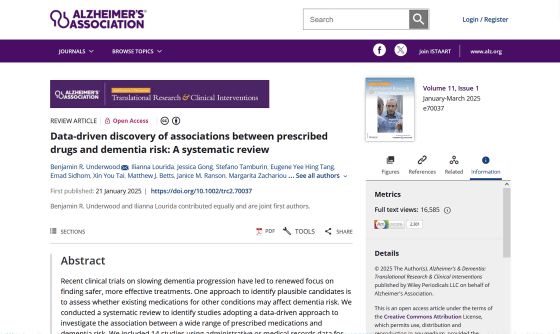Study finds that vaccinations and antibiotic use are associated with lower risk of dementia

Dementia is a serious public health issue that causes great suffering for patients and their caregivers, and is said to cost the world more than $1 trillion. A new study that analyzed medical data from more than 100 million people in total found that vaccination and antibiotic use are associated with a lower risk of dementia.
Data‐driven discovery of associations between prescribed drugs and dementia risk: A systematic review - Underwood - 2025 - Alzheimer's & Dementia: Translational Research & Clinical Interventions - Wiley Online Library

Antibiotics, vaccinations and anti-inflammatory medication linked to reduced risk of dementia | University of Cambridge
https://www.cam.ac.uk/research/news/antibiotics-vaccinations-and-anti-inflammatory-medication-linked-to-reduced-risk-of-dementia
New Study Links Common Meds to Reduced Dementia Risk : ScienceAlert
https://www.sciencealert.com/new-study-links-common-meds-to-reduced-dementia-risk
Research on dementia is being conducted around the world, but the development of drugs to slow or prevent the progression of dementia has not been going well. As new drug development is difficult, researchers are trying to find existing drugs that have already been confirmed as safe and that are effective against dementia, and to significantly accelerate the transition to clinical trials.
Ben Underwood , assistant professor of geriatric psychiatry at the University of Cambridge, said: 'We urgently need new treatments to slow down the progression of dementia, if not prevent it. If we can find drugs that are already approved for other diseases, we can test them and, importantly, get them to patients much quicker than developing an entirely new drug. The fact that it's already available reduces costs and increases the chances of it being approved for use by the NHS.'
Therefore, Underwood and his team conducted a systematic review of existing scientific literature to identify existing drugs that may alter dementia risk.
The included studies reported on the association between medications prescribed for conditions other than dementia and the risk of dementia. Of the 14 studies included in the review, nine were conducted in the United States, two in Japan, one in South Korea, one in Germany, and one in Wales . The total number of participants was more than 130 million, and more than one million cases of dementia were identified.

The analysis found that certain medications, such as antibiotics, antiviral drugs, and vaccines, were associated with a lower risk of dementia. In particular, vaccines against bacterial and viral infections, such as
This study only investigated the relationship between drugs and dementia risk, and the mechanism by which vaccines and antibiotics are associated with a reduced risk of dementia is unknown. However, previous research has suggested that viral and bacterial infections are risk factors for dementia , and research results have been published showing that the shingles vaccine reduces the risk of dementia.
The study also found that anti-inflammatory drugs such as ibuprofen may be associated with a reduced risk of dementia. In recent years, there has been a growing view that inflammation is the cause of various diseases, and the research team pointed out that some genes that increase the risk of dementia are also associated with inflammatory pathways.
'Just because a particular drug is associated with a change in dementia risk doesn't necessarily mean that it causes dementia or actually treats dementia,' said study co-author Ilianna Lourida , a dementia researcher at the University of Exeter. 'For example, diabetes is known to increase dementia risk, so people who take medications to control blood sugar levels have a higher dementia risk, but that doesn't mean that the medication increases the risk.'
'Pooling these massive health datasets will provide one piece of evidence that can help us focus which drugs to try first,' Underwood said. 'We hope this will speed up the process of finding much-needed new dementia treatments and getting them to patients.'

Related Posts:
in Science, Posted by log1h_ik







